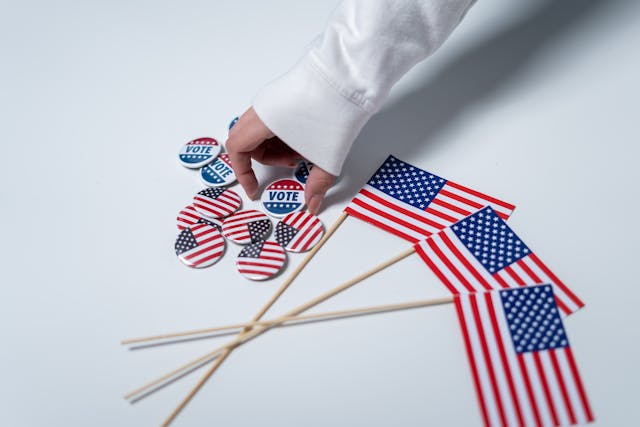
Why does America use the Electoral College system? America uses the Electoral College because the early American government didn’t trust the voting people to be able to vote for the correct candidate instead of the one whose name they just happen to recognize.
How does the Electoral College system work? The Electoral College has 538 members. Each state has a different number of Electoral College members. They can generally be anyone who is not employed by the federal government because that might bias them. On election night, each state runs its elections as you would expect, based on the popular vote. Usually, the winner will either be the Republican Party or the Democratic Party. However, at the end of election night, the official vote hasn’t actually happened yet. Whichever party wins the state vote, the Electoral College members in that state are sworn to vote for that party. The Electoral College members of each state go to their state’s capital building to cast their vote. They are sworn to vote for the winning party, but they don’t have to. They always do, though. Once that has finished, each state sends the result of their vote to Congress where they are opened on January 6th and witnessed by the Vice President. At this point, the election is complete.
The number of Electoral College members a state has is equal to the number of Senators and Representatives that state has in Congress. So, the next question is, how is the number of Senators and Representatives a state has decided? Every state, no matter their size, gets two Senators that sit in the US Senate. The number of representatives that go and sit in the House of Representatives, is based on the population of each state. California has the largest population of all the states (39 million) and they get 53 representatives. Texas is next (30 million) and they get 38 representatives. The smallest state by population is Wyoming (584,000) and they get 1 representative. Generally, a state gets a representative for every 700,000 people they have.
The system was decided upon in 1787 during the Constitutional Convention. This was a meeting held in Philadelphia to work out the new United States Constitution. Each state sent delegates to the conference. The United States had just gained independence from Britain and was working out how its government and country should be run. One issue was how to elect the president. Many of the delegates thought that Congress should just chose the president, but that didn’t seem democratic enough. The other option was a popular vote. At the time, the only people who could vote were white, property owning men, but the delegates didn’t believe that these men could be trusted to vote for the best candidate. Another problem with the popular vote is that it would give states with a larger population more say in the election. The United States might have become a country, but they were still thinking as individual states and they didn’t want to give up power to other states. The solution they came up with was the Electoral College system. One problem with this system was that many states had slaves. It had been decided in the same conference that three-fifths of the slaves in a state could be counted as part of the population. That meant states with more slaves would get more Electoral College members.
With a few changes, the Electoral College system has stayed almost the same to this day. More people can now vote since the days when it was thought up, but the system is still the same. Recently, though, many people are suggesting that the system should be changed. What are the problems with it? The main problem is that a candidate can win the Electoral College vote (get over 270 Electoral College votes) without winning the popular vote. This has happened a few times. The most recent was in 2016 when Donald Trump beat Hillary Clinton. He won the Electoral College vote, but she won more overall votes. When this happens, it means that a person who won fewer than half of the votes becomes president. Another problem is that the election generally comes down to a few states that might go either way. These are known as “swing states” and their Electoral College votes can decide the election. That means candidates spend a lot more time campaigning in those states than they do in other ones. And the last problem is it gives the Republicans an unfair advantage. Studies have shown that when the popular vote is very close, or the Republicans are two points lower than the Democrats, they will win far more often than the Democrats. There are some ideas for systems to replace the Electoral College system with, but it would have to get past the Republicans first, and that is not very likely to happen. And this is what I learned today.
Sources
https://www.cbsnews.com/news/why-electoral-college-2024
https://www.britannica.com/topic/three-fifths-compromise
https://en.wikipedia.org/wiki/Constitutional_Convention_(United_States)
https://en.wikipedia.org/wiki/United_States_Electoral_College#/media/File:ElectoralCollege2024.svg
https://www.archives.gov/electoral-college/allocation
https://walberg.house.gov/about/how-congress-works
https://www.britannica.com/topic/largest-U-S-state-by-population Photo by cottonbro studio: https://www.pexels.com/photo/american-flags-and-pins-4669118/

Pingback: #595 Why does the house always win in a casino?
Pingback: Why do Oxford and Cambridge Universities have so many colleges?
Pingback: #738 Where did Freemasons come from?
Pingback: #758 What are pork barrel projects?